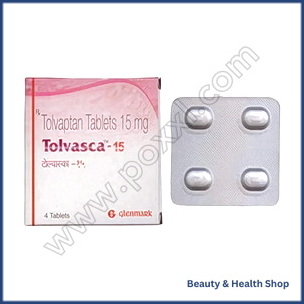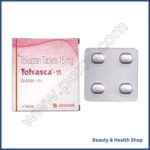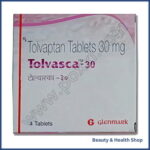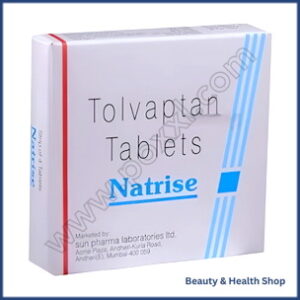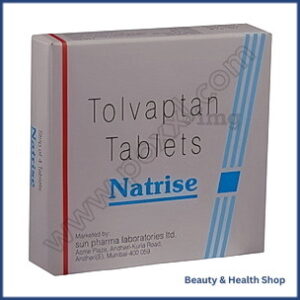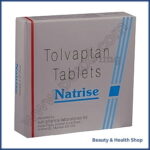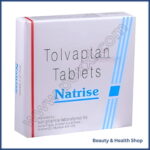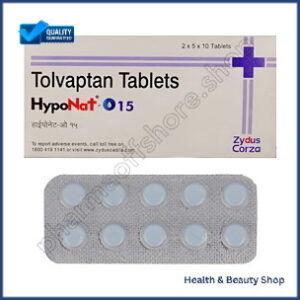ADDICTION
ALCOHOL DEPENDENCE
QUIT SMOKING
ALLERGY
ANTI FUNGAL
FUNGAL INFECTION
FUNGAL NAIL INFECTIONS
ANTI-REJECTION DRUGS
ANTI WORM
ANTIBIOTIC
BACTERIAL INFECTIONS
ARTHRITIS
GOUT
OSTEOARTHRITIS
RHEUMATOID ARTHRITIS
BLOOD
LOW PLATELET COUNT
THROMBOPHLEBITIS
VARICOSE VEINS
COLON
ANAL FISSURE
PILES
ULCERATIVE COLITIS
DIABETES CARE
DIABETES INSIPIDUS
DIABETES TYPE
DIABETIC FOOT ULCERS
GLUCOSE MONITOR
EYES/EAR CARE
DRY EYES
EYE CARE
EYE EXAMINATION
EYE INFECTION
EYE LASHES
EYE PAIN
GLAUCOMA
OCULAR HYPERTENSION
UVEITIS
FEVER CARE
MALARIA
RHEUMATIC FEVER
TYPHOID FEVER
GASTROINTESTINAL
ACIDITY
CONSTIPATION
CROHN'S DISEASE
DIARRHOEA
GALLBLADDER STONES
INTESTINAL ULCERS
IRRITABLE BOWEL SYNDROME
MOTION SICKNESS
NAUSEA
Tolvasca (Tolvaptan)
Tolvasca 15 mg (Tolvaptan)
Tolvasca 30 mg (Tolvaptan)
| Active Ingredient (Generic Name): | Tolvaptan |
|---|---|
| Indication: | Syndrome of inappropriate antidiuretic hormone secretion (SIADH) |
| Manufacturer | Glenmark Pharmaceuticals Ltd. |
| Packaging: | 4 tablets in one strip |
From: $319.00
You are prescribed Tolvasca, a medication that acts as a selective vasopressin V2 receptor antagonist. It targets specific receptors in the kidneys to regulate water reabsorption, leading to increased urine production and higher blood sodium levels. Tolvasca is commonly used to treat conditions such as hyponatremia, heart failure, and SIADH, effectively raising sodium levels and reducing the risk of hospitalization and mortality. While potential side effects may include nausea and diarrhea, Tolvasca is known to improve cognitive function and overall quality of life. Ongoing research continues to enhance the understanding of Tolvasca’s benefits and how it can optimize treatment outcomes for patients.
Main Points
- Tolvasca targets vasopressin V2 receptors in the kidneys, reducing water reabsorption and increasing urine production.
- It is effective in treating hyponatremia, heart failure, and SIADH by elevating sodium levels and relieving associated symptoms.
- Common side effects may include nausea, vomiting, diarrhea, and headache, with rare instances of severe liver injury reported.
- Tolvasca has been found to slow cyst growth in polycystic kidney disease, leading to improved kidney function and a decreased risk of kidney failure.
- Ongoing research is focused on optimizing dosing schedules and exploring new formulations to enhance Tolvasca’s effectiveness and potential applications.
How Tolvasca Works in the Body
Tolvasca acts by binding to vasopressin V2 receptors in the collecting ducts of the kidneys, inhibiting the function of vasopressin, a hormone that controls water reabsorption. This binding reduces water reabsorption into the bloodstream, leading to increased urine production. Consequently, the body eliminates more water, causing a rise in blood sodium levels. Tolvasca‘s targeted action on vasopressin V2 receptors helps maintain fluid and electrolyte balance without impacting electrolyte levels, distinguishing it from conventional diuretics. This specificity makes Tolvasca a valuable treatment option for certain medical conditions.
Uses and Benefits of Tolvasca
In exploring Tolvasca’s benefits, one can discover its effectiveness in treating various medical conditions. Tolvasca’s unique mechanism of action makes it a viable option for conditions like hyponatremia, heart failure, and syndrome of inappropriate antidiuretic hormone secretion (SIADH).
By raising sodium levels in the blood, Tolvasca helps alleviate symptoms linked to hyponatremia such as headaches, fatigue, and seizures. In heart failure patients, Tolvasca lowers the risk of hospitalization and mortality by increasing sodium levels and reducing fluid retention. Moreover, Tolvasca proves beneficial in managing SIADH, a condition marked by excessive antidiuretic hormone production leading to low sodium levels.
Tolvasca’s advantages include its ability to enhance serum sodium levels, thereby decreasing the likelihood of complications associated with hyponatremia. Patients may also notice improvements in cognitive function, reduced hospital visits, and an enhanced quality of life. When considering Tolvasca as a treatment, it is crucial to discuss individual needs and medical history with a healthcare provider.
Side Effects and Precautions
Tolvasca may cause side effects, including nausea, vomiting, diarrhea, and headache. These effects are typically mild and temporary, but it’s crucial to inform your doctor if they persist. In rare instances, Tolvasca can lead to severe side effects like liver injury, potentially resulting in liver failure or death. Regular monitoring of liver function is necessary while on Tolvasca, and any signs of liver damage should be reported promptly, such as dark urine, yellowing of the skin or eyes, or extreme fatigue.
Precautions to take with Tolvasca include avoiding its use if you have liver disease, are pregnant, or breastfeeding. It’s also advisable to steer clear of grapefruit juice or grapefruit consumption during Tolvasca treatment to reduce the risk of adverse effects. Understanding these potential side effects and following precautions can help mitigate the risks associated with Tolvasca therapy.
Tolvasca and Polycystic Kidney Disease
Tolvasca, a vasopressin V2 receptor antagonist, has been proven to decelerate the progression of polycystic kidney disease (PKD), a genetic condition characterized by multiple cysts forming on the kidneys. PKD can result in kidney failure, hypertension, and other complications. Tolvasca is approved for treating adult patients with autosomal dominant PKD, offering the following advantages:
- Inhibited cyst growth: Tolvasca slows down the expansion of kidney cysts, postponing the advancement of the disease.
- Enhanced kidney function: By reducing cyst growth, Tolvasca helps maintain kidney function and lowers the risk of kidney failure.
- Alleviated symptoms: Tolvasca relieves symptoms like pain, high blood pressure, and kidney damage associated with PKD.
The Future of Tolvasca Research
Researchers are actively exploring new avenues to enhance Tolvasca’s therapeutic potential in treating PKD. One key focus is optimizing dosing regimens to improve efficacy and minimize side effects. Novel formulations and delivery methods are being investigated to enhance patient outcomes. Efforts are underway to identify biomarkers for predicting treatment responses, enabling more personalized medicine. Additionally, researchers are studying Tolvasca’s potential in treating other conditions like autosomal dominant polycystic liver disease. As research progresses, Tolvasca is expected to play a broader role in managing diseases associated with excessive vasopressin activity. Ongoing research will solidify Tolvasca’s position as a crucial tool in combating PKD and related disorders.
Frequently Asked Questions
Can Tolvasca Be Used in Conjunction With Other Medications?
When considering combining medications, it is important to exercise caution and evaluate potential interactions between drugs before adding a new one to your regimen. Consulting your doctor or pharmacist to discuss your medications and any possible interactions is essential. They can help you determine if it is safe to use a new medication alongside your existing ones. Prioritize open communication with your healthcare provider to ensure your safety.
Is Tolvasca Available in Generic or Brand-Name Form Only?
The medication Tolvasca is currently available only as a brand-name drug. Once the patent for Tolvasca expires, generic versions may become available in the market.
Can Tolvasca Be Used to Treat Other Kidney-Related Diseases?
Understanding the primary use of Tolvasca for autosomal dominant polycystic kidney disease (ADPKD) is essential. While not officially approved for other kidney disorders, ongoing research is exploring its potential in treating conditions like heart failure and hyponatremia. Further studies are needed to confirm its efficacy and safety for these uses.
Is Tolvasca Safe for Use in Pediatric Patients?
Caution should be exercised when considering Tolvasca for pediatric patients due to limited research on its safety and efficacy in this population. Insufficient data exists to support its use in children, and the safety profile of Tolvasca in this age group remains unknown. Therefore, it is advisable to refrain from using this medication in children unless further research is conducted or specific pediatric labeling is provided.
Can Tolvasca Be Used During Pregnancy or Breastfeeding?
When considering medication during pregnancy or breastfeeding, caution is necessary. It is generally advisable to avoid using medications during these periods unless essential. Consulting a healthcare provider is crucial to assess potential risks and benefits. In some instances, the benefits may outweigh the risks, but careful consideration is vital to ensure a healthy outcome for both the mother and the baby.
Conclusion
When considering Tolvasca, it is important to note its effectiveness in managing hyponatremia and slowing kidney function decline in patients with polycystic kidney disease. While potential side effects should be taken into account, the benefits of Tolvasca make it a valuable treatment option. Ongoing research will continue to reveal its full potential, offering new insights into its uses. Consult with your healthcare provider to determine if Tolvasca is suitable for your needs.


